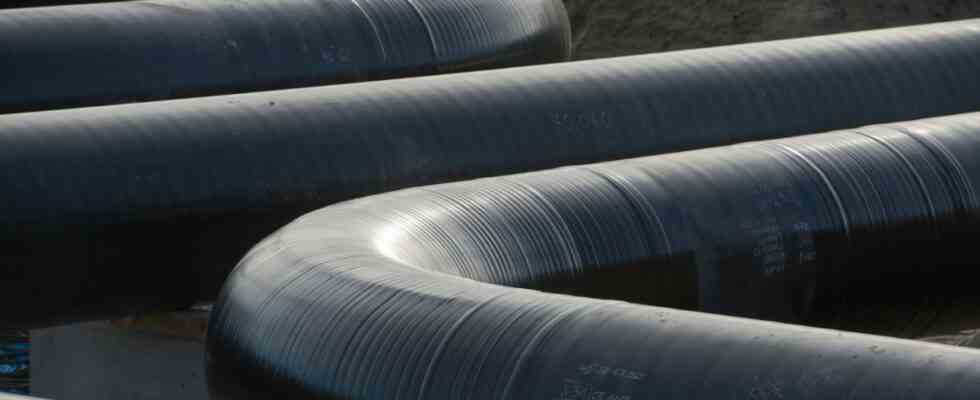It’s the 14th day of the war and of course, says Olaf Scholz, “right now” it’s about peace. You owe that to the people of Ukraine. Scholz just had lunch with Canadian Prime Minister Justin Trudeau. There was talk about how a ceasefire can be achieved, but also about “long-term developments in the world,” as Scholz now reports. Climate change plays a “very, very central role” for both countries. For the first time after two weeks of a political state of emergency, Scholz is trying to talk about the topic that should actually be the focus of his chancellorship, climate neutrality by 2045. Canada is “like-minded” and an alliance partner, for example as a future supplier of green hydrogen, he praises.
But that too cannot be separated from the war. In the short and medium term, says Scholz, Canada could also help Germany to diversify its energy supply with fossil fuels, in other words help to become more independent of Russia. “In any case, we will buy terminals on the North Sea coast,” says Scholz. In the short term, however, the Chancellor sees no way, he makes it clear once again, of doing without oil and gas from Russia without major upheaval. Scholz reveals that preparations have been underway since December for the possible loss of Russia as a supplier. “That’s why we also know how complicated it is.”
Electricity associations are also demanding a reduction in electricity and value-added tax
The Federal Cabinet initiated at least a small relief for consumers on Wednesday: the abolition of the green electricity levy on July 1st. But what the coalition once planned to alleviate the burden of rising CO2 prices on consumers is now just a drop in the bucket. In the last few days alone, the Ukraine war has once again pushed up gas and oil prices massively. “The markets are taking into account the risk of an embargo on fossil fuels,” says Ingbert Liebing, head of the municipal utility association VKU. An actual ban on imports, such as that imposed on oil by the United States on Tuesday, could “lead to even more drastic reactions, with serious consequences for the entire economy,” warns Liebing. Further relief is necessary – after all, households are threatened with additional burdens of “several thousand euros”.
There are plenty of demands for this. Electricity associations are also demanding a reduction in electricity and value-added tax; the Left Party advocates a Ukraine solo, through which millionaires and billionaires shoulder part of the burden; Environmental groups are suggesting a kind of European climate social fund – income from trading in CO2 emission certificates should be distributed to poorer households. And in Greece, Prime Minister Kyriakos Mitsotakis is demanding a cap on wholesale gas prices across Europe. The nervousness in Europe is growing. Federal Economics Minister Robert Habeck (Greens) had repeatedly warned of social tensions in Germany as well if the energy prices of an embargo on Russian raw material imports continued to rise.
Russian oil accounts for around 35 percent of all imports
However, a lot of energy could also be saved in the short term. The environmental organization Greenpeace presented a plan on Wednesday to reduce the country’s oil demand. A temporary speed limit alone – 100 kilometers per hour on freeways, 80 on country roads – could reduce imports by 2.5 percent. If Sundays were car-free in the future, as was the case during the oil price crisis, that would save another 3.1 percent. “Such interventions would definitely be appropriate,” agrees the Regensburg energy economist Michael Sterner. Above all, a speed limit is effective. “It doesn’t cost anything except for a few signs,” says Sterner, “but it brings a lot.”
Greenpeace plans a number of other savings, more bicycle and rail traffic, more home office, a ban on domestic flights – and thus comes to ten to twelve percent savings. Russian oil, however, accounts for around 35 percent of all imports.
On Tuesday, the EU Commission presented a plan to reduce imports of Russian natural gas by two-thirds this year. “Well before 2030” the European Union should become completely independent of it. Meanwhile, scientists are calling for consequences to be drawn as quickly as possible – and forgoing the installation of additional gas heaters, for example. “Any investment in additional systems will cement this dependency situation,” says Martin Pehnt, head of the Heidelberg Institute for Energy and Environmental Research. At the same time, greater independence does not happen overnight. “What we screwed up in the last 20 years, we can’t make up for in a year,” says Pehnt.

